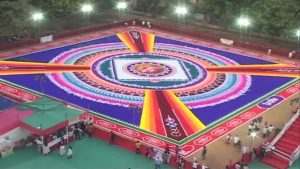 MUMBAI: On the occasion of Gudi Padwa, an 18,000 square feet long Rangoli was made in Maharashtra within a duration of 9 hours. As many as 70 artists made the Rangoli by using 900 kgs of rangoli powder at Thane’s Gaondevi Maidan.
MUMBAI: On the occasion of Gudi Padwa, an 18,000 square feet long Rangoli was made in Maharashtra within a duration of 9 hours. As many as 70 artists made the Rangoli by using 900 kgs of rangoli powder at Thane’s Gaondevi Maidan.
In India, people from across the length and breadth of the county have a distinct tradition of celebrating New Years specific to the region they hail from. The people of the state of Maharashtra celebrate their New Year on the first day of the Chaitra month in the Hindu Lunar calendar. This day is called Gudi Padwa. The Konkani community refers to this day as Samwatsara. This year, Gudi Padwa will be celebrated on March 18.
What is a Gudi?
A wooden stick is covered with a piece of bright red or yellow coloured cloth. Then a Kalash made of silver, copper or bronze is placed upside down on one end of the stick. A dash of vermillion (kumkum) and turmeric (haldi) are applied on the outer surface of the Kalash. This ensemble is called Gudi and it’s placed outside the door or the window so that everyone in the vicinity gets to see it. A garland made of sugar candy (saakhar gaathi) and neem leaves are hung along with the Gudi. This ritual signifies the bitter sweet experiences of life.
How do Maharashtrians celebrate Gudi Padwa?
Days before the festival, people start cleaning their homes and courtyards to start preparations for the actual day. On the day of the festival, people decorate their doorsteps with Rangoli. Flowers are used for decorating the house and a toran made of mango leaves is hung across the top of the door.
People take bath and wear new clothes and dress up in traditional style. Women drape the Navari and the men wear Kurta teamed up with Dhoti or Pyjama. People offer their prayers to the Gudi after placing it on the window or door. They offer flowers, perform the aarti and put Akshat on the Gudi.
The family gets together to celebrate their New Year by consuming a preparation made of neem leaves, jaggery to symbolise the diverse aspects of life. Shrikhand and Puran Poli are also prepared on this day.
Spiritual significance of Gudi Padwa
On this day, Lord Ram returned to Ayodhya along with his consort Sita and brother Lakshama after defeating demon King Ravana in Lanka.
Leave a Reply